重点词汇讲解及练习
- 格式:doc
- 大小:150.50 KB
- 文档页数:20
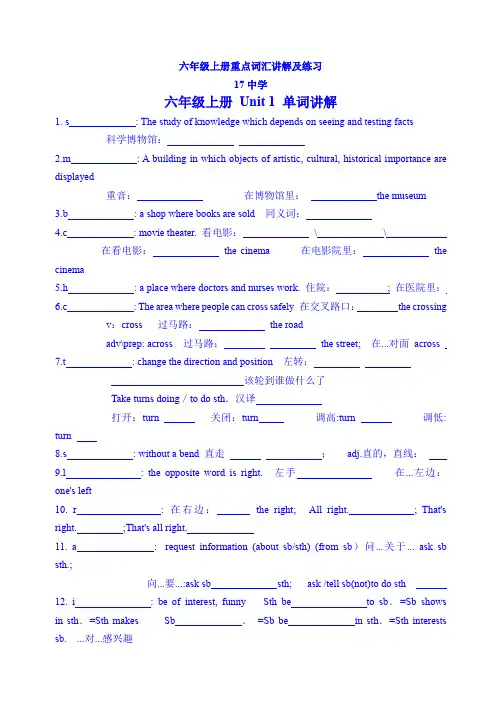
六年级上册重点词汇讲解及练习17中学六年级上册Unit 1 单词讲解displayed在博物馆里:the cinema the cinema在医院里:The area where people can cross safelycrossingv:cross the roadadv\prep: across the street; 在...对面acrossTake turns doing/to do sth关闭:调高:turn 调低:turnone's leftAll That'ssth.;12. be of interest, funny Sth sb.=Sb showsin sth.=Sth makes =Sb sth.=Sth interestssb. ...对...感兴趣13. Italian 重音:Italian; 意大利:Italythe street到达:get here /there/home =arrive here/there/home=reach here/there/home 到这/到那/到家归还:give 放弃:give17. far:be 离…远; 据...,就...far告诉某人做:tell sb (not)to do.讲故事\笑话\实话\谎话tell a story\a joke\the truth\a lie六年级上册Unit 1 单元练习一、单项选择( ) 1. -_____ is the hospital? -It’s over there.A. WhyB. WhereC. When( ) 2. _____ clever boys they are!A. WhatB. HowC. Which( )3. –Excuse me, sir. Where can I send the postcard? -You can send it in the _____.A. science museumB. post officeC. hospital( ) 4. The park is _____ the post office.A. inB. onC. next to( ) 5. What _____ interesting book!A. anB. aC. the( )6. The hospital is _____ Dongfang Street.A. atB. onC. to( ) 7. -_____ can I get to the science museum? -Go straight. Turn right at the hospital.A. HowB. WhereC. When( ) 8. Mary wants to see a film. She is going to the _____.A. cinemaB. hospitalC. museum( )9. Let’s _____ first. I am so hungry.A. eatB. to eatC. eating( ) 10. The park is _____ the cinema.A. in front ofB. in the front ofC. near to( ) 11. --_____hard the students work in the classroom. --Everybody is busy with his work.A. What aB. WhatC. How( ) 12. Jack sits in front of me. So I sit _____ him.A. beforeB. nearC. behind( ) 13. Turn right _____ the cinema.A. atB. inC. on( )14. --Can you jump _____ the wall? --It's very tall.A. overB. onC.to( )15. Mary can help you _____ the cinema.A. findsB. findingC. find( )16. –What time does Mike usually get _____ the shop? --At seven.A. toB. atC. up( )17. –I'm so hungry. I know _____Italian restaurant --Really? Let's go.A. aB. anC. \( )18. –Tom is a kind boy. He is trying____ a tour guide for Oliver in Beijing now?--What a god boy he is!A. beB. to beC. to being( )19. –What do you think of the book? --I'm_____ in reading it. It's an_____ storyA. interested, interestedB. interesting, interestedC. interested, interesting( )20. –_____ there a desk or any chairs in the room? --No, there is nothing in the room.A. AreB. IsC. Have二、用所给词的正确形式填空1. There is _______________(a) Italian restaurant near the library.2. Let _____________(we) go!3. Can you help ______________(they)?4. ________________(be) your sister’s parents in the library?5. Mike’s brother likes _________________(go) swimming.6. My brother likes _________________(run) very much.7. We should wait at the __________________(cross).8. Can you help ___________________(his)?9. I want to see an ___________________ (interest) film with my friend.10.I like to eat ___________________ (Italy) food very much.三、翻译句子1.博物馆的商店在哪?________________ is the ___________________ shop?2.在大门附近。
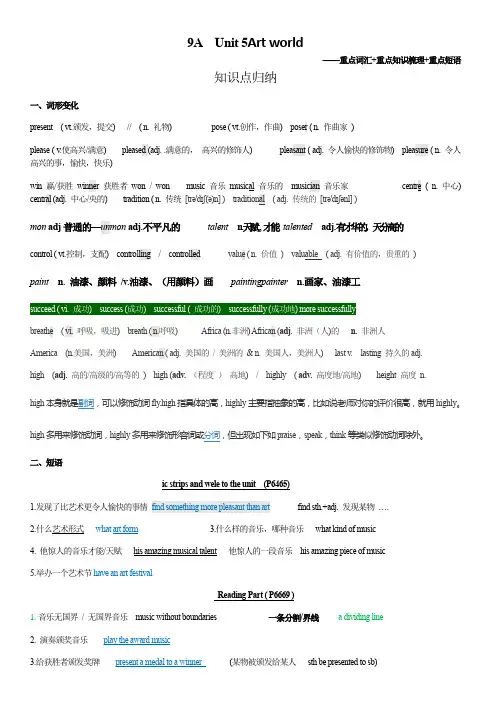
9A Unit 5Art world——重点词汇+重点知识梳理+重点短语知识点归纳一、词形变化present ( vt.颁发,提交) // ( n. 礼物) pose ( vt.创作,作曲)poser ( n. 作曲家)please ( v.使高兴/满意) pleased (adj. .满意的,高兴的修饰人) pleasant ( adj. 令人愉快的修饰物) pleasure ( n. 令人高兴的事,愉快,快乐)win 赢/获胜winner 获胜者won / won music 音乐musical 音乐的musician 音乐家( n. 中心) central (adj. 中心/央的) tradition ( n. 传统[trə'dɪʃ(ə)n] ) traditional ( adj. 传统的[trə'dɪʃənl] )mon adj普通的—unmon adj.不平凡的talent n.天赋,,才能talented adj.有才华的,天分高的control ( vt.控制,支配) controlling / controlled value ( n. 价值) valuable ( adj. 有价值的,贵重的)paint n. 油漆、颜料/v.油漆、(用颜料)画paintingpainter n.画家、油漆工breathe ( vi. 呼吸,吸进) breath ( n.呼吸) Africa (n.非洲) African (adj. 非洲(人)的n.非洲人America (n.美国,美洲) American ( adj. 美国的/ 美洲的& n. 美国人,美洲人) last v. lasting 持久的adj.high (adj.高的/高级的/高等的) high (adv. (程度)高地) / highly ( adv. 高度地/高地) height 高度n.二、短语ic strips and wele to the unit (P6465)1.发现了比艺术更令人愉快的事情find something more pleasant than art find sth.+adj. 发现某物….2.什么艺术形式what art form3.什么样的音乐,哪种音乐what kind of music4. 他惊人的音乐才能/天赋his amazing musical talent 他惊人的一段音乐his amazing piece of music5.举办一个艺术节have an art festivalReading Part ( P6669 )1.音乐无国界/ 无国界音乐music without boundaries 一条分割/界线 a dividing line2. 演奏颁奖音乐play the award music3.给获胜者颁发奖牌present a medal to a winner (某物被颁发给某人sth be presented to sb)颁发某物给某人present sth. to sb. = present sb with sth 为某人提供某物provide sb. with sth. = provide sth. for sb.4. 一位世界著名的作曲家a worldfamous poser5. 在中国湖南省的中部地区in Central China’s Hunan/ in central Hunan , China6. 对音乐感兴趣/展示了对音乐的兴趣show an interest in music对…感兴趣= be / bee interested in……7. 喜欢天籁之音like the sounds of nature(淙淙的)流水声和(风吹过的声音/飒飒的风声)the sounds of the rushing water and the blowing wind一口中国古钟的钟声the sounds of an ancient Chinese bell8.没有乐器have no musical instruments = don’t have any musical instruments9..以一种西方的风格in a W estern style 以传统的方式in the traditional style10. 进入中央音乐学院enter the Central Conservatory of Music [kənˈsɜːvətri]进入enter sp. = go into sp.11.去美国继续学习go on to study in the US 继续做别的事go on to do继续做原来的事go on doing12.认识杰出的音乐家get to know great musicians13.因(做)……而最为人熟知be best known for ( doing ) sth.14.因….赢得奥斯卡大奖win an Oscar for ……..15. 多次将其运用于他的音乐中use them a lot in his music过去常常做某事used to do sth习惯于(做)某事be / get used to (doing) sth 被用来做某事be used to do sth/ for (doing) sth16.通过控制水的流速17. 在不同的脑海里会产生不一样的画面create different pictures in different minds18. 用像石头和纸之类的普通物品编音乐make music with mon objects like stones and paper = use mon …. paper to make music19..北京奥运会的乐曲the music for the Beijing Olympics20.成功地把中西方音乐融合在了一起. successfully bring Chinese and W estern music together.21.在东西方之间搭建了一座桥梁build a bridge between the East and the West22.结合/混在一起创造出一种新的类型。
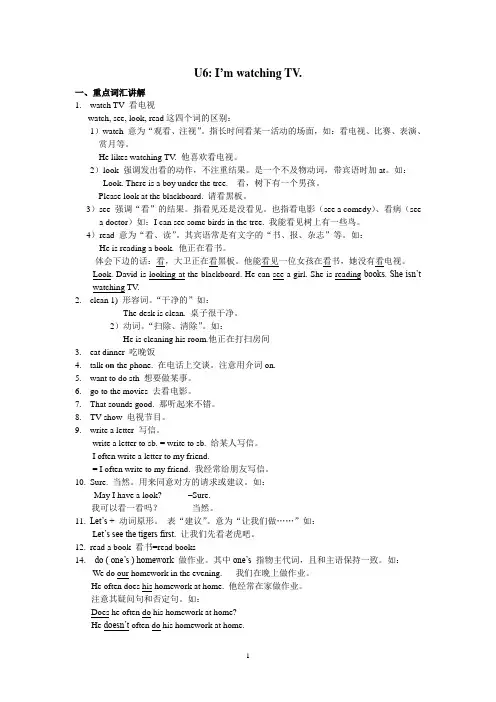
U6: I’m watching TV.一、重点词汇讲解1.watch TV 看电视watch, see, look, read这四个词的区别:1)watch 意为“观看、注视”。
指长时间看某一活动的场面,如:看电视、比赛、表演、赏月等。
He likes watching TV. 他喜欢看电视。
2)look 强调发出看的动作,不注重结果。
是一个不及物动词,带宾语时加at。
如:Look. There is a boy under the tree. 看,树下有一个男孩。
Please look at the blackboard. 请看黑板。
3)see 强调“看”的结果。
指看见还是没看见。
也指看电影(see a comedy)、看病(seea doctor)如:I can see some birds in the tree. 我能看见树上有一些鸟。
4)read 意为“看、读”。
其宾语常是有文字的“书、报、杂志”等。
如:He is reading a book. 他正在看书。
体会下边的话:看,大卫正在看黑板。
他能看见一位女孩在看书,她没有看电视。
Look. David is looking at the blackboard. He can see a girl. She is reading books. She isn’t watching TV.2.clean 1) 形容词。
“干净的”如:The desk is clean. 桌子很干净。
2)动词。
“扫除、清除”。
如:He is cleaning his room.他正在打扫房间3.eat dinner 吃晚饭4.talk on the phone. 在电话上交谈。
注意用介词on.5.want to do sth 想要做某事。
6.go to the movies 去看电影。
7.That sounds good. 那听起来不错。
show 电视节目。
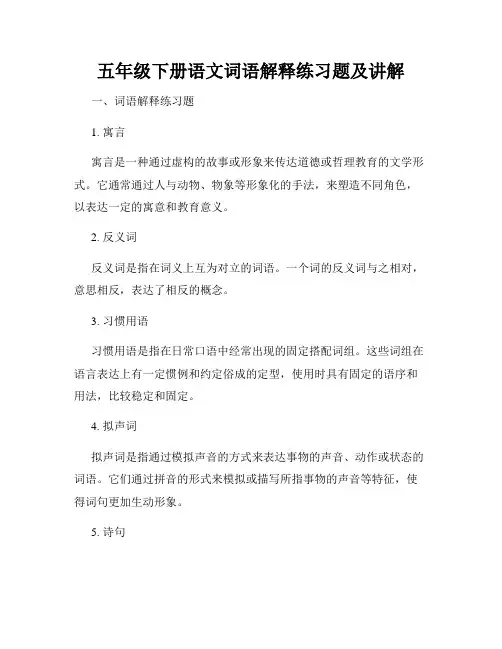
五年级下册语文词语解释练习题及讲解一、词语解释练习题1. 寓言寓言是一种通过虚构的故事或形象来传达道德或哲理教育的文学形式。
它通常通过人与动物、物象等形象化的手法,来塑造不同角色,以表达一定的寓意和教育意义。
2. 反义词反义词是指在词义上互为对立的词语。
一个词的反义词与之相对,意思相反,表达了相反的概念。
3. 习惯用语习惯用语是指在日常口语中经常出现的固定搭配词组。
这些词组在语言表达上有一定惯例和约定俗成的定型,使用时具有固定的语序和用法,比较稳定和固定。
4. 拟声词拟声词是指通过模拟声音的方式来表达事物的声音、动作或状态的词语。
它们通过拼音的形式来模拟或描写所指事物的声音等特征,使得词句更加生动形象。
5. 诗句诗句是诗歌中具有独立意义且具有完整表达的句子。
它常常以严密的语言形式,通过韵律、押韵等手法来表达诗人的情感、思想或描绘景物。
二、词语解释讲解1. 寓言寓言是一种古老而广泛流传的文学形式。
它以虚构的故事情节和形象化的手法,通过动物、物象等拟人化表现,传达道德、教育或哲理等方面的思想。
著名的寓言作家如《伊索寓言》的伊索以及《格林童话》的格林兄弟等,通过寓言的形式,以幽默、夸张、讽刺等手法,生动地表达了人类的行为准则和道德规范。
2. 反义词反义词是汉语词汇中的重要组成部分。
它由两个词语互为对立的意义而构成,可以强调事物的对立、相反或互补等关系。
比如“高”与“低”、“大”与“小”等,都是反义词的典型例子。
利用反义词可以使语言更加生动、形象,增强表达的准确性和表现力。
3. 习惯用语习惯用语是语言中的一种惯用表达方式,是在日常交流中形成的固定搭配词组。
它们往往由两个或多个词语组成,具有固定的语序和用法。
习惯用语在日常交流中使用频率较高,往往能够准确地表达某种情感、某种态度或某种特定的语义。
4. 拟声词拟声词是一种模拟或描写事物声音、动作或状态的词语。
它们采用拟声的方式,通过发出的声音来模拟描述所指对象的特征。
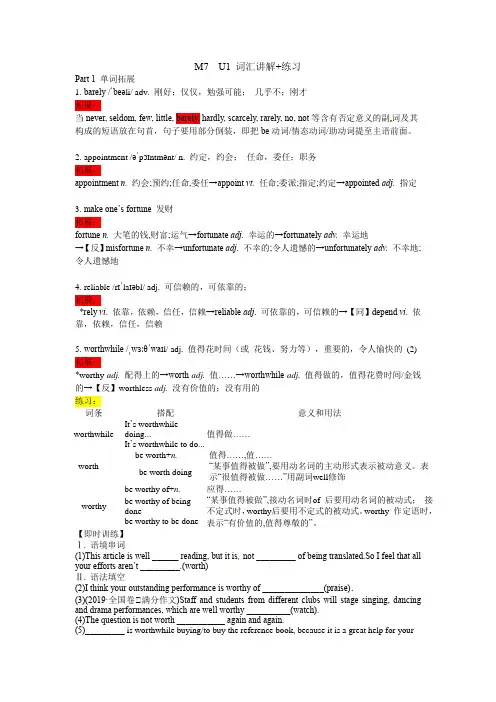
M7 U1 词汇讲解+练习Part 1 单词拓展1.barely /ˈbeəli/ adv. 刚好;仅仅,勉强可能;几乎不;刚才拓展:当never, seldom, few, little, barely, hardly, scarcely, rarely, no, not 等含有否定意义的副词及其构成的短语放在句首,句子要用部分倒装,即把be动词/情态动词/助动词提至主语前面。
2.appointment /əˈpɔɪntmənt/ n. 约定,约会;任命,委任;职务拓展:appointment n.约会;预约;任命,委任→appoint vt.任命;委派;指定;约定→appointed adj.指定3.make one’s fortune 发财拓展:fortune n.大笔的钱,财富;运气→fortunate adj.幸运的→fortunately adv.幸运地→【反】misfortune n.不幸→unfortunate adj.不幸的;令人遗憾的→unfortunately adv.不幸地;令人遗憾地4.reliable /rɪˈlaɪəbl/ adj. 可信赖的,可依靠的;拓展:*rely vi. 依靠,依赖,信任,信赖→reliable adj. 可依靠的,可信赖的→【同】depend vi. 依靠,依赖,信任,信赖5.worthwhile /ˌwɜːθˈwaɪl/ adj. 值得花时间(或花钱、努力等),重要的,令人愉快的(2) 拓展:*worthy adj.配得上的→worth adj.值……→worthwhile adj.值得做的,值得花费时间/金钱的→【反】worthless adj. 没有价值的;没有用的练习:词条搭配意义和用法worthwhile It’s worthwhiledoing...It’s worthwhile to do...值得做……worth be worth+n.值得……,值……be worth doing“某事值得被做”,要用动名词的主动形式表示被动意义。
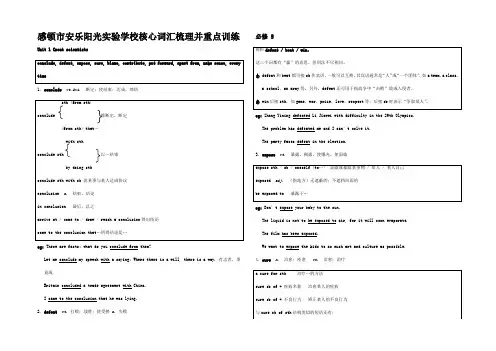
感顿市安乐阳光实验学校核心词汇梳理并重点训练必修 5Unit 1 Great scientists1. conclude vt.&vi. 断定;使结束;达成,缔结eg: These are facts; what do you conclude from them?Let me conclude my speech with a saying: Where there is a will, there is a way. 有志者,事竟成Britain concluded a trade agreement with China. I came to the conclusion that he was lying. 2. defeat vt . 打败;战胜;使受挫 n . 失败eg: Zhang Yining defeated Li Jiawei with difficulty in the 29th Olympics. The problem has defeated me and I can ’t solve it. The party faces defeat in the election. 3. expose vt . 暴露,揭露,使曝光,使面临eg: Don’t expose your baby to the sun.The liquid is not to be exposed to air, for it will soon evaporate. The film has been exposed.We want to expose the kids to as much art and culture as possible. 4. cure n . 治愈;痊愈 vt . 治愈;治疗eg: There is no cure for the common cold at present.Can you cure me of my cold?That nasty shock cured him of his inquisitiveness forever.5. blame vt. 责备;谴责;把…归咎于n. 过失;责备eg: She blamed him for the failure of their marriage.Don’t go trying to blame it on me!If anyone is to blame, it’s me.She took the blame on herself.6. contribute vt.&vi. 捐款;贡献;捐助eg: All the people in our school contributed something to the disaster in Sichuan.Various factors contributed to his downfall.She contributes regularly to a physics journal.7. put forward 提出,建议;推荐;将…提前eg: She put forward some good proposals for educational reform.Her name was put forward as the best for the job.Put the clock forward by 5 minutes. 8. apart from 除…之外;此外eg: This essay is good apart from a couple of spelling mistakes. Apart from the occasional visit, what does Alan do for his kids? I often took some old toy cars apart when I was a child. 9. make senseeg: Can you make any sense of the article at all?It makes good sense to grow fruit trees on the hillside. In a sense, learning the law is like learning a language. In no sense can the issue be said to be resolved.10. So many thousands of terrified people died every time there was an outbreak.eg: Every time I catch a cold, I have pains in my back. The first time I climbed onto the wall, I felt very nervous. She let out a cry the moment she saw the snake. I left immediately the clock struck 5. 练习:1. Once the price had been agreed, a deal . (很快就达成协议)。
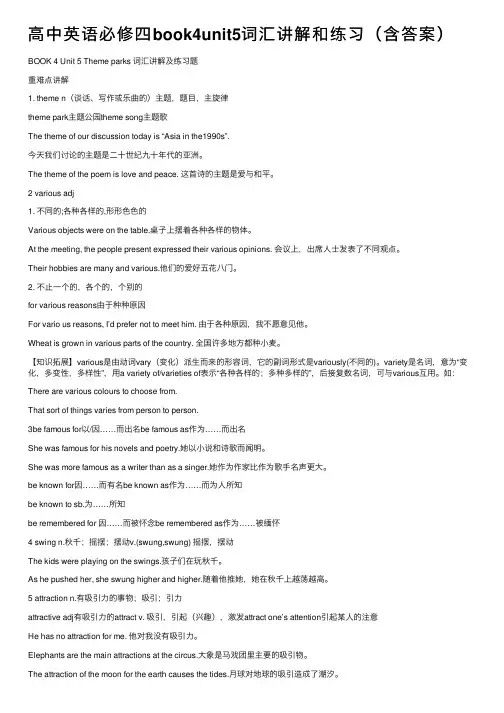
⾼中英语必修四book4unit5词汇讲解和练习(含答案)BOOK 4 Unit 5 Theme parks 词汇讲解及练习题重难点讲解1. theme n(谈话、写作或乐曲的)主题,题⽬,主旋律theme park主题公园theme song主题歌The theme of our discussion today is “Asia in the1990s”.今天我们讨论的主题是⼆⼗世纪九⼗年代的亚洲。
The theme of the poem is love and peace. 这⾸诗的主题是爱与和平。
2 various adj1. 不同的;各种各样的,形形⾊⾊的Various objects were on the table.桌⼦上摆着各种各样的物体。
At the meeting, the people present expressed their various opinions. 会议上,出席⼈⼠发表了不同观点。
Their hobbies are many and various.他们的爱好五花⼋门。
2. 不⽌⼀个的,各个的,个别的for various reasons由于种种原因For vario us reasons, I’d prefer not to meet him. 由于各种原因,我不愿意见他。
Wheat is grown in various parts of the country. 全国许多地⽅都种⼩麦。
【知识拓展】various是由动词vary(变化)派⽣⽽来的形容词,它的副词形式是variously(不同的)。
variety是名词,意为“变化,多变性,多样性”,⽤a variety of/varieties of表⽰“各种各样的;多种多样的”,后接复数名词,可与various互⽤。
如:There are various colours to choose from.That sort of things varies from person to person.3be famous for以/因……⽽出名be famous as作为……⽽出名She was famous for his novels and poetry.她以⼩说和诗歌⽽闻明。
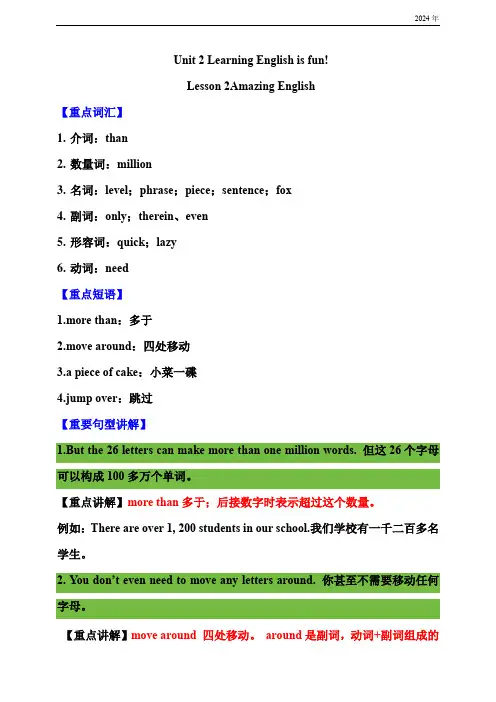
Unit 2 Learning English is fun!Lesson 2Amazing English【重点词汇】1.介词:than2.数量词:million3.名词:level;phrase;piece;sentence;fox4.副词:only;therein、even5.形容词:quick;lazy6.动词:need【重点短语】1.more than:多于2.move around:四处移动3.a piece of cake:小菜一碟4.jump over:跳过【重要句型讲解】1.But the 26 letters can make more than one million words. 但这26个字母可以构成100多万个单词。
【重点讲解】more than多于;后接数字时表示超过这个数量。
例如:There are over 1, 200 students in our school.我们学校有一千二百多名学生。
2. You don’t even need to move any letters around. 你甚至不需要移动任何字母。
【重点讲解】move around 四处移动。
around是副词,动词+副词组成的短语,宾语为代词时,代词应放在中间。
例如:The box is very heavy, you can’t move it around。
箱子很重,你移动不了它。
3. The quick brown fox jumps over the lazy dog.敏捷的棕色狐狸跳过懒惰的狗。
【重点讲解】jump over跳过例如:My pet Eddie is funny. It can jump over the desk. 我的宠物埃迪很有趣。
它能跳过桌子。
【课堂练习】一、单词拼写1.Be ________ (快的)! We have no time left.2.Dale is ________ (只有) six years old, but he can play ping-pong very well. 3.You cannot be too ________ (懒惰的). You must make your bed every morning.4.Your English is very good. You are at a high _________ (水平).5.I don’t understand the meaning of these _________ (句子).二、适当形式填空6.Newspapers always tell people a lot of ________. (fact)7.What do these ________ (sentence) mean?8.LinaBell is a pink _________ (fox). Many young people like it. 9.Follow my tips and put the beef (牛肉) between the two _________ (piece) of bread.三、完成句子10.他们把所有的家具搬动了一遍。
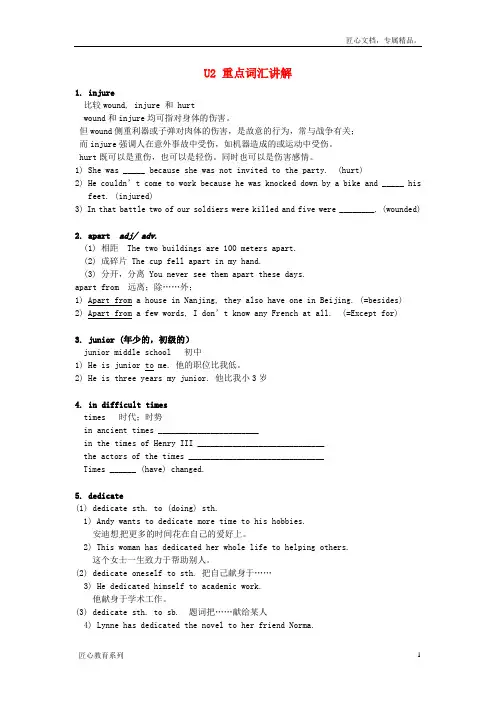
U2 重点词汇讲解1. injure比较wound, injure 和 hurtwound和injure均可指对身体的伤害。
但wound侧重利器或子弹对肉体的伤害,是故意的行为,常与战争有关;而injure强调人在意外事故中受伤,如机器造成的或运动中受伤。
hurt既可以是重伤,也可以是轻伤。
同时也可以是伤害感情。
1) She was _____ because she was not invited to the party. (hurt)2) He couldn’t come to work because he was knocked down by a bike and _____ hisfeet. (injured)3) In that battle two of our soldiers were killed and five were ________. (wounded)2. apart adj/ adv.(1) 相距 The two buildings are 100 meters apart.(2) 成碎片 The cup fell apart in my hand.(3) 分开,分离 You never see them apart these days.apart from 远离;除……外;1) Apart from a house in Nanjing, they also have one in Beijing. (=besides)2) Apart from a few words, I don’t know any French at all. (=Except for)3. junior (年少的,初级的)junior middle school 初中1) He is junior to me. 他的职位比我低。
2) He is three years my junior. 他比我小3岁4. in difficult timestimes 时代;时势in ancient times _______________________in the times of Henry III _____________________________the actors of the times _______________________________Times ______ (have) changed.5. dedicate(1) dedicate sth. to (doing) sth.1) Andy wants to dedicate more time to his hobbies.安迪想把更多的时间花在自己的爱好上。
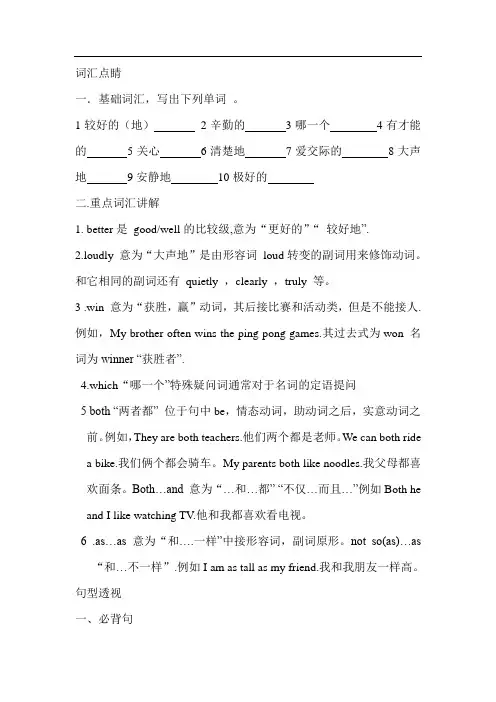
词汇点睛一.基础词汇,写出下列单词。
1较好的(地)2辛勤的3哪一个4有才能的5关心6清楚地7爱交际的8大声地9安静地10极好的二.重点词汇讲解1. better是good/well的比较级,意为“更好的”“较好地”.2.loudly 意为“大声地”是由形容词loud转变的副词用来修饰动词。
和它相同的副词还有quietly ,clearly ,truly 等。
3 .win 意为“获胜,赢”动词,其后接比赛和活动类,但是不能接人.例如,My brother often wins the ping pong games.其过去式为won 名词为winner “获胜者”.4.which“哪一个”特殊疑问词通常对于名词的定语提问5 both “两者都” 位于句中be,情态动词,助动词之后,实意动词之前。
例如,They are both teachers.他们两个都是老师。
We can both ride a bike.我们俩个都会骑车。
My parents both like noodles.我父母都喜欢面条。
Both…and 意为“…和…都” “不仅…而且…”例如Both he and I like watching TV.他和我都喜欢看电视。
6 .as…as意为“和….一样”中接形容词,副词原形。
not so(as)…as“和…不一样”.例如I am as tall as my friend.我和我朋友一样高。
句型透视一、必背句1.Tom比Sam更聪明吗? 不,Sam比Tom更聪明。
Is Tom Sam? No, he . Sam isthan Tom.2.Tara和Tina学习一样努力。
Tara works hard Tim.3.你的父亲和母亲谁更受欢迎?Who is , your father or your mother?二.例句解析1. Both Sam and Tom can play the drums , but Sam plays them better than Tom. Sam 和Tom 都会打鼓但是Sam比Tom 打得更好。
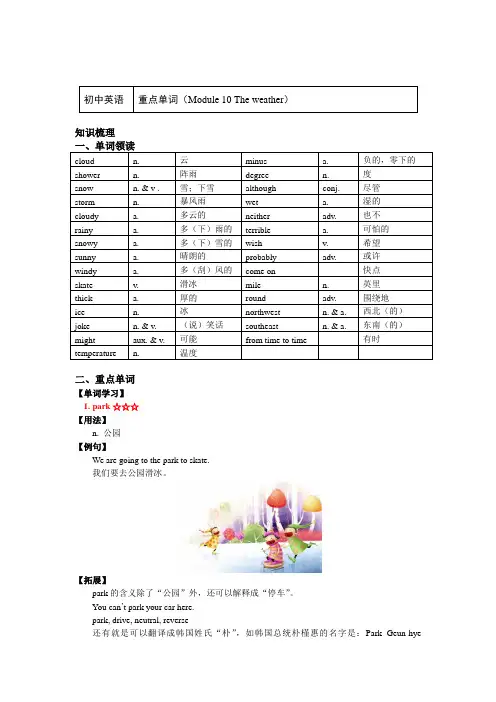
初中英语重点单词(Module 10 The weather)知识梳理cloud n. 云minus a. 负的,零下的shower n. 阵雨degree n. 度snow n. & v . 雪;下雪although conj. 尽管storm n. 暴风雨wet a. 湿的cloudy a. 多云的neither adv. 也不rainy a. 多(下)雨的terrible a. 可怕的snowy a. 多(下)雪的wish v. 希望sunny a. 晴朗的probably adv. 或许windy a. 多(刮)风的come on 快点skate v. 滑冰mile n. 英里thick a. 厚的round adv. 围绕地ice n. 冰northwest n. & a. 西北(的)joke n. & v. (说)笑话southeast n. & a. 东南(的)might aux. & v. 可能from time to time 有时temperature n. 温度二、重点单词【单词学习】1. park ☆☆☆【用法】n. 公园【例句】We are going to the park to skate.我们要去公园滑冰。
【拓展】park的含义除了“公园”外,还可以解释成“停车”。
You can’t park your car here.park, drive, neutral, reverse还有就是可以翻译成韩国姓氏“朴”,如韩国总统朴槿惠的名字是:Park Geun-hye【考题链接】请判断下列park的含义:1. Can I park my car here?2. Is there a parking lot?3. I will park my car outside the park.答案:1. 停车 2. 停车场 3. 前者为停车,后者是公园思路分析:根据句子含义和结构来判断。
⼤学英语B级词汇、语法重点及练习(专项训练)⼀.名词1.常见的不可数名词advice luggage bread damage food equipment furniture hair homework housework information knowledge progress population2.可数名词的特殊形式1)“s”结尾,单复同形means series species works2)形式上是单数,但⽤作复数police mankind people cattle audience3)合成名词的单复数变化,通常在主⼲词上加“s”brother-in-law (单数)brothers-in-law (复数)passer-by (单数)passers-by (复数)story-teller (单数)story-tellers (复数)⼆.形容词1.形容词可以跟在以下半系动词的后⾯做表语appear turn feel become stay look come prove grow go get keep2.容易混淆的形容词alone lonely alive living liveclean clear considerate considerable continual continuous dead deadlyeconomical economic efficient effective healthful healthy intense intensive imaginary imaginable imaginativesensitive sensible successful successive valuable invaluable pricelessvalueless worthless historical historic respectable respectful respectivelike likely alike三.副词1.有些形式相异的副词,意义差别也⽐较⼤,如:high highly just justly hard hardly free freely late lately most mostly near nearly2.些形容词也以-ly结尾,应避免误⽤为副词,如:lively lovely lonely friendly ugly costlysilly3.形容词和副词只差⼀个词尾,但意义⼤相径庭hard hardly like likely bare barelybad badly scarce scarcely四.介词1.介词和名词的搭配1)名词+ aboutconcern about remark about complaint aboutopinion about doubt abouthope for need for sorry for reason fortalent for3)名词+ fromabsence from difference from protection from 4)名词+ inconfident in delight in difficulty in experience in faith in pride in success in trust in5)名词+ ofaccount of capability of care of description of feeling of habit of impression of intention of number of pleasure of possibility of shortage of 6)名词+ on (upon )authority on dependence on effect on remark on emphasis on influence on impression on stress on7)名词+ overadvantage over control over quarrel over victory over worry over8)名词+ toanswer to access to attention to approach to contrast to exception to gratitude to invitation to limit to objection to reference to solution to9)名词+ withagreement with contact with common with connection with conversation with trouble with 2.介词+ 名词的固定搭配at ease at first at last at crossroads at leastat large at once at a loss at present at willby accident by chance by turns for certainin general in a sense in theory in practicein the way in the past in the future in advance in return in turn in that event in some respects in a hurry in addition in fact in place in sighton average on duty on vacation3.介词和形容词的搭配1)形容词+ aboutanxious about careful about curious about concerned about careless about certain about particular about doubtful about2)形容词+ atangry at annoyed at good at quick at pleased at 3)形容词+ foranxious for convenient for eager for famous for hungry for known for late for necessary for possible for ready for responsible for suitable for 4)形容词+ fromabsent from different from distant from free from far from protected from5)形容词+ ofafraid of aware of ashamed of capable of considerate of conscious of composed of deprived of full of fond of independent of proud of regardless of sick of short of tired of thoughtful of6)形容词+ toaccustomed to contrary to convenient to devoted to essential to familiar to favorable to opposed to peculiar to relevant to be used to beneficial to7)形容词+ inabsorbed in confident in disappointed in experienced in interested in lacking in lost in rich in successful in8)形容词+ withassociated with annoyed with angry withbusy with friendly with nervous with patient in⼀.单词1. She has been busy after she became the manager. Her working day often __ well into the night.A. expandsB. expendsC. extendsD. extents2. This __ him to the first rank among the writers of fiction.A. raisedB. liftedC. roseD. made3. It is arranged that the opening ceremony will __ at 10:00 Wednesday morning next week.A. happenedB. occurC. appearD. take place4. The sight __ to me the days of my childhood in the countryside.A. remindedB. recalledC. rememberedD. recommended5. Good transportation is essential to the __ growth of the country.A. economyB. economicalC. economicsD. economic6. The judge’s order to arrest me was no longer __.A. creativeD. competent7. Burglars broke is into the __ flat while the Whites were on holiday.A. vacantB. blankC. bareD. empty8. She is engaged in __ research.A. historicalB. historicC. historyD. histrionic9. She had never felt so __ and helpless in her life.A. alongB. lonelyC. aloneD. aloud10. As far as hobbies are concerned, Tom and his brother have little in __ .A. commonB. averageC. popularD. normal11. The restoration of China’s lawful rights in the United Nations was a great __ in history.A. caseB. incidentC. accidentD. event12. Mr. Smith will leave for New Y ork in__November.A. lateB. latelyC. later__ .A. senseB. senselessC. sensitiveD. sensible14. It’s almost __ that our team will win.A. certainB. sureC. exactD. accurate15. Some people in the back row were __ al the time during the lecture.A. speakingB. talkingC. sayingD. replying16. The school is going to __ the sports meeting to next week.A. postponeB. delayC. replaceD. exchange17. People can’t bear this __ hot weather.A. continualB. continuousC. variousD. variety18. Educational TV stations offer teaching in various __ ranging from home nursing to art appreciation.A. directionsB. pointsC. occurredD. subjects19. I didn’t know what to do but when an idea suddenly __ .A. happenedB. entered20. Waiter in restaurants __ all kinds of food and drink to customers.A. entertainB. serveC. provideD. offer⼆.固定搭配1. The failure in examination __ his inadequate preparation.A. resulted inB. resulted fromC. led toD. let in2. The party __ us to turn grief into strength.A. called offB. called atC. called onD. called to3. He __ a number of journals for his information.A. went throughB. saw throughC. looked throughD. notice through4. We have run __ typing paper.A. intoB. overC. onD. out of5. Scientists will have to __ new methods of increasing the world’s food supply.A. come up toB. come up withC. come up forD. come put of6. you can __ our family whenever you are in need of assistance.A. associate withD. relate to7. The “lost money” __ to be in the safe all the time.A. turned intoB. turned outC. turned overD. turned down8. “Psychology” is __ the study of human behavior by scientific methods.A. defined asB. taken asC. regarded asD. believed as9. John found it extremely difficult to __ his had habitsA. do withoutB. dispose ofC. clear upD. do away with10. They could hardly believe that the trouble should __ the new engine of the car.A. lie inB. turn toC. come toD. bring down11. We didn’t tell her the sad news for fear that she might not __ the heavy blow.A. come up withB. make up forC. put up withD. stand up for12. The chairman put __ his plan, expecting that everyone would approve it.A. towardB. up13. Y ou must take into __ the boy’s long illness.A. accountB. conditionC. chanceD. calculation14. I don’t like to disturb you, because you’re quite tired __ working hard today.A. onB. fromC. outD. of15. Unlike most Chinese, many Americans __ bread and eggs for breakfast every morning.A. used to eatB. are used to eatC. are used to eatingD. used to eating16. Y ou should learn to take __ of every opportunity to improve oral English.A. chanceB. useC. actionD. advantage17. I took someone’s umbrella by __ .A. heartB. mistakeC. natureD. the way18. Some men broke __ the central bank near the post office last Sunday.A. intoB. upC. offnot notice me enter the room.A. onB. inC. ofD. at20. He tried to make __ all the trouble he had caused.A. outB. upC. forD. up for三.语法1. In the last ten years, great changes __ in my hometown.A. have been taken placeB. took placeC. was taken placeD. have taken place2. He discovered that his luggage __ stolen.A. had beenB. has beenC. wasD. would be3. I __ everything by the time you get back next time.A. shall finishB. will be finishingC. have finished C. shall have finished4. I have no doubt __ he will overcome all his difficulties.A. whetherB. whichC. thatD. if5. The science __ deals with the law of nature is calledB. whoC. by whichD. whom6. The city __ my father grew up is not far from here.A. whatB. whereC. whereverD. which7. __ you lice next door to Mr. Roberts, you ought to be able to recognize him.A. AlthoughB. SinceC. WhereD. Unlike8. Anyone can borrow books from this library __ he keeps them clean.A. even ifB. unlessC. as long asD. so that9. All matter is made of atoms, which are too small __ even through the most powerful microscope.A. to be seemB. to see themC. to have seenD. to be seeing10. Every day they spend a lot of time __ their assignments.A. to doB. on doingC. by doingD. doing11. __ five successful novels, she published a collection of short stories.A. Having been written C. WritingB. Having Written D. To write12. What do you think of the performances __ by the girls of Grade III?A. givingB. gaveC. having givenD. given13. It is necessary that the project __ before next Monday.A. be completedB. is completedC. is to be completedD. will be completed14. I lift very early last night, but I wish I __ so early.A. haven’t leftB. didn’t leaveC. hadn’t leftD. couldn’t leave15. I was ill that day. Otherwise I __ the meeting.A. would have attendedB. would attendC. attendedD. should had attended五.以单词正确的形式填空1. Y ou’d better _____ (copy) the whole article at once.2. The manager promised ____ (get) me a position in his company.3. Remember ____ ( lock) the door when you leave.4. The main benefit of ____ (work) with the company is the opportunity to travel abroad.5. I don’t mind ____ (have) a dog in the house so long as it’s clean and it doesn’t smell.6. Did you have any difficulty _____ (get) a visa to Britain?7. The children from the U.S. got used to ____ (eat)Chinese food quite soon.8. They stopped ____ (search) for the missing plane as the weather was very rough.9. If you intend ____ (visit) the National Garden, please contact me soon.10. I wondered why the boy often avoided ____ (talk) with his classmates.11. To my ____ (surprising), he passed the test.12. In recent years, Japan has to become less ____ (depend) on importing fish from other countries.13. He told me that it was not his fault, he was not_____ (response)for the accident.14. The weather here is ____ (change). Y ou’d better bring a rain coat with you in case it rains.15. Although I do not share his religious ____ (believe), I respect him.16. When I apply for jobs, I find I am always at a ____ (advantage) because I can’t drive.。
高考冲刺:重点词汇五Unit 1- unit 3知识讲解重点单词:trick【点拨】trick n.诡计;恶作剧;花招;窍门;trick or treat 不送礼物就捣乱(万圣节前夕孩子们挨户要礼物的用语)play a trick on sb. 捉弄某人have a trick of doing sth. 有做某事的习惯John taught me the trick of opening a bottle of wine. 约翰教会了我打开酒瓶盖的窍门。
The children loved to play tricks on their teacher. 这些孩子好跟他们的老师玩恶作剧。
vt.哄骗,欺骗trick sb. into doing sth. 哄骗某人做某事trick sb. out of sth. 骗取某人某物She tricked me into paying for her meal at the restaurant. 她在饭馆里骗我替她付了饭钱。
admire【点拨】admire vt. 赞美;钦佩,羡慕admire sb. for sth. 因某事而钦佩某人The school is widely admired for its excellent teaching. 这所学校教学优秀,远近称誉。
【拓展】admiration n.赞美,钦佩admirable adj.可饮佩的,极佳的have admiration for sb. / sth. 羡慕/钦佩某人/物watch/gaze in admiration 赞赏地观看/凝视着They looked in silent admiration at the painting. 他们默默地欣赏着那幅画。
admiring adj.赞赏的,羡慕的He gave her an admiring look. 他向她投以赞赏的一瞥。
apologize【点拨】apologize v.道歉apologize to sb. for (doing) sth. 因某事向某人道歉=make an apology to sb. for (doing) sth.=say sorry to sb. for (doing) sth.=offer sb. an apology for (doing) sth.accept/refuse an apology 接受/拒绝道歉Bill was apologizing to his friend for having kept her waiting for a long time.比尔因让他的朋友等了好长时间,正在道歉呢。
Unit8 重点词汇讲解及练习1. finish doingfinish意为“完成,结束”,作及物动词时,其后可跟名词、代词或动名词。
即:finish sth.或finish doing sth.。
例如:I finished my homework this morning.我今天上午做完了作业。
When did you finish drawing the picture?你什么时候画完那副画的?Can you finish reading this book tomorrow?明天你能读完这本书吗?【拓展】能接v.-ing作宾语的动词还有:practice; enjoy; mind; keep等。
practice doing sth. 练习做某事enjoy doing sth.喜欢做某事mind doing sth.介意做某事keep doing sth. 一直做某事例如:In my class, most of the students enjoy singing English songs.在我们班,大多数学生喜欢唱英语歌。
Do you mind opening the window? 你介意打开窗户吗?2. finallyfinally是副词,多修饰动态动词,位置较灵活,可位于句中、句首或句尾,位于句中时,要放在be动词、助动词和情态动词之后,行为动词之前。
例如:They finally found the lost child. 他们终于找到了丢失的孩子。
He worked out the math problem finally. 他终于解出了那道数学题。
【拓展】finally; at last和in the end的辨析:(1) finally强调在列举论点时,引出最后一个内容,有表示盼望已久的事情终于实现了的含义。
侧重最后的结果。
例如:They talked about it for hours, finally they decided not to go.他们为此讨论了几个小时,最后决定不去了。
八年级英语下册Unit1 知识梳理(重要句型、重点单词、短语解析及练习)课文翻译:Section A 会话Role-play the conversation. 角色扮演对话。
Lisa, are you OK? 丽莎,你还好吗?I have a headache and I can't move my neck. 我头痛,我的脖子不能动了。
What should I do? 我头痛,我的脖子不能动了。
Should I take my temperature? 我应该测测体温吗?No, it doesn't sound like you have a fever. 不,你看起来不像是发烧了。
What did you do on the weekend? 你周末做什么了?I played computer games all weekend. 我整个周末都在玩电脑游戏。
That's probably why. 这可能就是你头痛的原因了。
You need to take breaks away from the computer. 你需要休息并且远离电脑。
Yeah, I think I sat in the same way for too long without moving. 是的,我想我是因为以同样的姿势坐的太久没有动。
I think you should lie down and rest. 我想你应该躺下休息。
If your head and neck still hurt tomorrow, then go to a doctor. 如果明天你的头部和颈部还疼,再去看医生。
OK. Thanks, Mandy. 好。
谢谢你,曼蒂。
Section A 短文Read the passage. 阅读下面的短文。
Do you think it comes from a newspaper or a book? 你认为这篇短文是出自一份报纸还是一本书?How do you know? 你是怎么知道的?Bus Driver and Passengers Save an Old Man 公交车司机和乘客救了一位老人At 9:00 a.m. yesterday, bus No. 26 was going along Zhonghua Road when the driver saw an old man lying on the side of the road. 在昨天上午9点,当司机看到一位老人躺在路边,26路公交车正在沿中华路行驶。
Unit1 How can we become good learners?Section B (1a -1e )重点词组1.make mistakes 犯错误2.have trouble (in )doing sth 做某事有困难3.from time to time 反复的;一遍又一遍4.get much listening practice 获得大量听力练习5.practice writing 练习写作6.pen pal 笔友重点句子精析1.I ofen make mistakes in grammar .make mistakes=make a mistake意为“犯错误”,by mistake意为“错误地”Mistake过去式.过去分词分别为mistook .mistakenEg:I ofen make mistakes in spelling .我经常在拼写上犯错误I just took your umbrella by mistake .我只是错拿了你的雨伞2.He can't get the pronunciation right .get....right...使...正确,这里的get为使役动词,right是形容词,作宾语补足语。
这种get+宾语+宾语补足语的结构通常表示“使某人或某物处于某种状态或位置”Eg:Can you get the car started ?你能让这辆车发动起来吗?3.I don't have a partner to practice English with .逻辑上,partner是with的宾语,本句中,动词不定式短语作名词partner的定于。
且不定式和名词是动宾关系,介词with不可省略Eg:I don't have a room to live in .模拟训练一.根据句意及首字母,用适当的形式填空1.I need a p_______to practice English with .2.You can write the new words in your n____and study them at home .3.We should try our best to find the right s_______to the problem .4.When you are in a 400-meter race ,s_____is the most important .5.Wide reading will i_______your vocabulary .二.用所给词的适当形式填空1.Could you please teach me how to _____________(pronunciation )this word ?2.The Air pollution is one of the biggest _________(challenge )in China today .3.Tony made some ________(spell )mistakes in his writing .4.They need to find a topic _____(talk )about .5.I need a partner _______(make )conversations with .Section B (2a-Self Check)重点词组1.depend on 依靠2.learning habits 学习习惯3.have sth in common 有....共同点4.pay attention to 注意,留心5.get bored 变得无聊6.be interested in 对...感兴趣7.review them on your own 自行复习8.instead of 而不是9.over and over again 一次又一次重点句子精析1.Everyone is born with the ability to learn .be born with...意为“天生具有”,the ability to do sth意为“做某事的能力”2.But whether or not you can do this well depends on your learning habits . Whether or not意为“是否”可以用来引导主语从句,宾语从句等,此句引导主语从句Eg:They are still talking about whether the girl should go there or not .他们还在讨论这个女孩是否去那里的问题。
【本讲教育信息】一. 教学内容:期末复习——单词二. 重点、难点:本学期重点单词Unit 11. rise v. 升起;上升;起立;起床The sun rises in the east and sets in the west. 太阳东升西落。
单词辨析:rise,raiserise(vi.)表示发出动作的主语自己移向较高的位置,不能接宾语。
I rose at 6:30 this morning. 今早我6点半起床的。
raise(vt.)表示的动作是作用于其他物体上的,后接宾语。
He couldn‟t raise the heavy box. 他无法举起那个重箱子。
2. find v. 发现,找到find sb. sth. = find sth. for sb. 为某人找到某物I looked for it everywhere , yet I couldn‟t find it. 我各处都找了,但无法找到它。
3. untilprep.到……为止,[常用在否定句中](=before)在……以前until four o'clock直到四点钟He did not go until night. 他直到夜里才走。
It was not until yesterday that I noticed it. 直到昨天我才注意到这件事。
conj.到……为止,在……以前,直到……才Until he returns, nothing can be done.他不回来什么也不能做。
Go straight on until you come to a large building.一直往前走,直到你走到一座大楼前。
单词辨析:until,tilltill与until同义,但在主句前的从句或短语中,通常用until。
例如:Until then, I knew nothing at all about it. 在那时以前,我对这事一无所知。
4. maybe adv. possibly, perhaps 也许,大概,可能Maybe he will come, maybe not. 他也许来,也许不来。
5. a lot of many, much, lots of 许多,单词辨析:many, much, lots ofmany 只能修饰可数名词;much只能修饰不可数名词;a lot of/ lots of两者都可以修饰。
在否定句中通常使用many和much,不用a lot of/ lots of。
There are a lot of/lots of people in the hall. 大厅里面有许多人。
Fely can‟t understand much Chinese. 菲丽不太懂汉语。
There is not much water in the glass. 玻璃杯里没有多少水。
Unit 21. acrossprep. 横过;越过;在对面run across the street 横穿马路sail across the Pacific横渡太平洋He lives across the street.他住在街对面。
We came across a new phrase.我们遇到了一个新成语。
adv.横过,交叉地,在对面The river is 50 metres across.河宽50米。
He couldn‟t g et the idea across to the class.他无法使班上学生了解这概念。
单词辨析:(1)across, over, throughacross:横过,穿过,是指从物体表面的一边到达另一边。
She went across the stone bridge. 她走过石桥。
over:越过,是指从物体的上方经过。
The plane was flying over the city. 当时,飞机正从城市上空飞过。
through:穿过,着重指穿过某一空间。
They went through the forest by themselves. 他们独自穿过树林。
(2)cross, acrosscross v. 横过,勾划,使交叉,She crossed the river finally. 最终她过了河。
n.十字架,十字形物the Red Cross(Society)红十字会the Victoria Cross维多利亚十字勋章而across 是介词,表示动作的方向。
2. start v. 开始;发动;动身start sth. 开始做某事start doing sth. 开始做某事start to do sth. 开始做某事The movie has just started. 电影刚开演。
3. shine v.(shone, shone)照耀,发光Her eyes shone with excitement. 她兴奋得两眼闪光。
Happiness shone from her face.她面露喜色。
vt.(shined/shined)擦亮shine one's shoes擦皮鞋4. wake v.(woke, waken)vt.叫醒,激发Please wake me up at 6∶00 tomorrow morning. 请明早6点叫醒我。
vi.醒来,醒着,警觉wake up 醒来I woke up at about 5:30 every morning. 我每天早上大约5点半睡醒。
5. hide v. 隐藏,隐瞒He hided the letter in a drawer. 他把信藏在了抽屉里。
Hide your light under a bushel.不露锋芒。
Let‟s play hide-and-seek. 我们玩捉迷藏游戏吧。
6. wait vi.(~for)等待,等候Wait a moment please.请稍等一会儿。
I am sorry to have kept you waiting.很抱歉让你久等了。
Our dinner is waiting for us.我们的晚餐已经准备好了。
That work will have to wait.那项工作需要暂时搁一下。
vt.等候;期待;延缓wait a person's return等待某人回来wait one's chance等待机会We waited dinner for him. 我们因等他而延缓开饭。
单词辨析:wait,awaitwait主要用作不及物动词,与for连用,表示等待人或物;后接动词不定式表示等待的目的;await通常用作及物动词,带有耐心等待的情绪,常和一些抽象名词连用,常常用表示事物的名词做主语。
Don‟t wait for me if I am late. 如果我迟到了,就别等我了。
Death awaits all men. 人皆有一死。
7. stay v. 停留,暂住I‟ll stay in London at least for one year. 我至少在伦敦暂住一年。
stay at home 留在家里stay up 熬夜保持(联系动词用法):stay还可用作联系动词,后面接表语,表示主语所处的状态If you stay healthy, you‟d better take exercise.要想保持健康,最好进行体育锻炼。
Unit 31. still adv. 还,仍,更,还要,尽管如此,依然adv. 仍然,还He came yesterday and he is still here. 他昨天来的,现仍在此。
My father still remembers his first day at school. 我的父亲仍记得他上学的第一天。
adj. 静止的,静寂的The sea was calm and still. 大海风平浪静。
Keep still while I comb your hair. 我给你梳头时,请不要动。
2. remember vt./vi.(常与to+inf, that连用)记得;记起;酬劳,送礼Do you remember me?你还记得我吗?I remember seeing her once.(=I remember that I saw her once.)我记得曾见过她一次。
Remember to phone me. 别忘了给我打电话。
Please remember the taxi driver.请别忘记给出租汽车司机小费。
Please remember me to your parents.请代我向你父母问候。
3. bring v. 带来,拿来He always brings a book with him whenever he comes.他每次来的时候,都带着一本书。
单词辨析:bring,take,carrybring“拿来,带来”,着重指从其它地方把事物带或拿来到说话人面前。
take“带走,拿走”,是指从说话人这里将东西带走。
carry “搬,扛”,没有固定的方向。
4. surprising adj. amazing,令人吃惊的,使人惊讶的;不寻常的surprising news惊人的消息知识拓展:surprise+ingsurprise vt.使惊奇,奇袭His anger surprised me——I had thought he was a calm person.他的愤怒使我很惊讶,我原来以为他是个冷静的人。
His colleagues were surprised at his absurd behavior.同事们对他那荒诞的行为感到吃惊。
n.惊奇,诧异,惊人之事,奇袭Don‟t tell him about the present——it‟s a surprise.不要告诉他礼物的事,这是个惊喜。
I looked at him in surprise . I didn‟t expect to see him again. 我惊奇地看他,没想到又见到他了。
用法:surprising,surprisedsurprising 在句子中作表语,其主语往往是表示事物的名词。
The news is surprising. 这个消息真是令人惊奇。
surprised 在句子中作表语,其主语通常是表示人的名词性单词。
I was surprised by the sad news. 我被这个悲伤的消息震惊了。
5. afraid adj. frightened 害怕,畏惧be afraid of sb./ sth. 害怕某人/物be afraid of doing sth. 害怕发生某事be afraid of to do sth. 害怕做某事情be afraid of that+从句,害怕,恐怕……He was afraid that he would lose. 他担心会输。